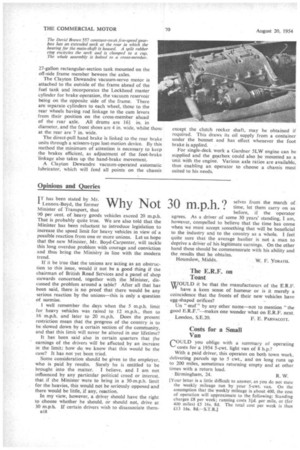Opinions and Queries
Page 52

If you've noticed an error in this article please click here to report it so we can fix it.
IT has been stated by Mr. I Lennox-Boyd, the former Minister of Transport, that 90 per cent. of heavy goods vehicles exceed 20 m.p.h. That is probably quite true. We are also told that the Minister has been reluctant to introduce legislation to increase the speed limit for heavy vehicles in view of a possible reaction from one or more unions. Let us hope that the new Minister, Mr. Boyd-Carpenter, will tackle this long overdue problem with courage and conviction and thus bring the Ministry in line with the modern trend.
If it be true that the unions are acting as an obstruction to this issue, would it not be a good thing if the chairman of British Road Services and a panel of shop stewards concerned, together with the Minister, discussed the problem around a table? After all that has been said, there is no proof that there would be any serious reaction by the unions—this is only a question of surmise.
I well remember the days when the 5 m.p.h. limit for heavy vehicles was raised to 12 m.p.h., then to 16 m.p.h. and later to 20 m.p.h. Does the present restriction mean that the progress of the country is to be slowed down by a certain section of the community, and that this limit will never be altered in our lifetime?
It has been said also in certain quarters that he earnings of the drivers will be affected by an increase in the limit; how do we know that this would be the case? It has not yet been tried. Some consideration should be given to the employer, who is paid by results. Surely he is entitled to be brought into the matter. I believe, and I am not influenced by any particular political creed or interest, that if the Minister were to bring in a 30-m.p.h. limit for the heavies, this would not be seriously opposed and there would be little, if any, reaction. In my view, however, a driver should have the right to choose whether he should, or should not, drive at 30 m.p.h. If certain drivers wish to disassociate them selves from the march of time, let them carry on as before, if the operator agrees. As a driver of some 30 years' standing, I am, however, compelled to believe that the time has come when we must accept something that will be beneficial to the industry and to the country as a whole. I feel quite sure that the average haulier is not a man to deprive a driver of his legitimate earnings. On the other hand these should be commensurate with his ability and the results that he obtains.
Hounslow, Middx. W. F. YORATH.
The E.R.F. on Toast
wouLD it be that the manufacturers of the E.R.F. " have a keen sense of humour or is it merely a coincidence that the fronts of their new vehicles have egg-shaped orifices?
Un " ceuf " by any other name—not to mention "the good E.R.F."—makes one wonder what on E.R.F. next.
London, S.E.20. F. E. PARNACOTT.
Costs for a Small Van
COULD you oblige with a summary of operating costs for a 1954 5-ewt light van of 8 h.p.?
With a paid driver, this operates on both town work, delivering parcels up to 5 cwt., and on long runs up to 200 miles, sometimes returning empty and at other times with a return load.
Birmingham, 24. R. W.
[Your letter is a little difficult to answer, as you do not state the weekly mileage run by your 5-cwt. van. On the assumption that the weekly mileage is about 400, the cost of operation will approximate to the following: Standing charges £8 per week; running costs 30. per mile, or (for 400 miles) £5 16s. 8d. The total cost per week is thus £13 16s. 8d.—S.T.R.)




































































































